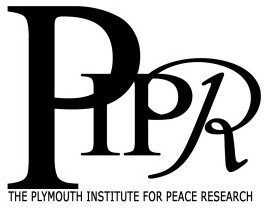New Atheist Exposed: How Sam Harris Smears Noam Chomsky and Arundhati Roy
By T.J. Coles
7 July, 2015
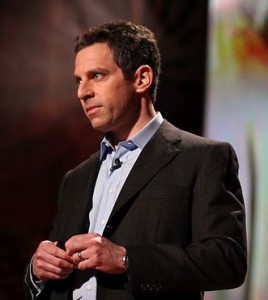
Sam Harris
A recent, heated email exchange between neuroscientist Sam Harris and retired linguistics Professor and anti-war campaigner, Noam Chomsky, garnered a great deal of public interest, with the Young Turks’ program on the debate receiving over 160,000 YouTube hits. [1]
Typical of the reflections on the debate, Kyle Schmidlin of Salon writes: “Harris conjures up a fantastical thought experiment to persuade Chomsky that some killings are less monstrous than others,” referring to the Clinton administration’s bombing of the Shifa pharmaceutical plant in Sudan in 1998. Schmidlin notes that “Chomsky is willing to make [moral] distinctions in real cases, and objects to Harris’s insistence that he “ignores the moral significance of intentions.”” [2]
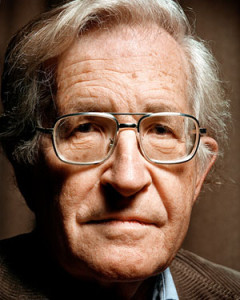
Noam Chomsky
These kind of analyses fail to get to the root of the problem: that Sam Harris wilfully distorted Noam Chomsky’s argument in the first place, and then expected Chomsky to respond as if Harris posed a fair set of questions. In my latest book, The New Atheism Hoax, I document case after case of New Atheists (Daniel Dennett, Richard Dawkins and the late Christopher Hitchens) suppressing counterarguments and omitting facts from their own sources in order to suit their arguments. Harris’s selective quotes from Noam Chomsky and Arundhati Roy are particularly instructive.
HARRIS VS. ROY
The New Atheism was born with Sam Harris’s book The End of Faith. It appeared in 2004, just in time for the invasion of Iraq by Britain and America a year earlier. As it became quite clear that the occupiers were in for the long haul and the civilian toll was beginning to mount with civil war (after the high toll of “shock and awe,”) it became necessary for propagandists to deflect attention from where it belonged, i.e., aggressive imperialism, to something else, in this case religious extremism (blaming Sunnis and Shiites for being driven to kill one another by religious hatred).
The anti-war movement is personified in Harris’s book by two well-known writers of the broad “left,” Noam Chomsky and Arundhati Roy. Painting Chomsky and Roy as marginal figures with blinkered morality was quite an achievement for pro-war propagandists. Harris has denied overtly supporting the invasion of Iraq, though his book certainly frames the issue in such a way.

Arundhati Roy
In The End of Faith, Harris writes that, “A nuclear war between India and Pakistan seems almost inevitable, given what most Indians and Pakistanis believe about the afterlife.” Mentioning Arundhati Roy, Harris adds: “Roy has said that Western concern over this situation is just a matter of white imperialists believing that [quoting Roy] “blacks [sic] cannot be trusted with the Bomb.”” Harris says that “[t]his is a grotesque charge. One might argue that no group of people can quite be “trusted” with the bomb, but to ignore the destabilizing role that religion plays on the subcontinent is both reckless and disingenuous.”
However, when we check the source (Roy’s book War Talk), we find that Roy actually wrote: “When India and Pakistan conducted their nuclear tests in 1998, even those of us who condemned them [emphasis added], balked at the hypocrisy of Western nuclear powers. Implicit in their denunciation of the tests was the notion that Blacks cannot be trusted with the Bomb.” Ergo, Roy did condemn the nuclear powers. She also condemned the religious fanaticism on both sides: “[N]ow the cry has gone up in the heartland: India is a Hindu country. Muslims can be murdered under the benign gaze of the state,” referring to the attacks in Gujarat in 2002.
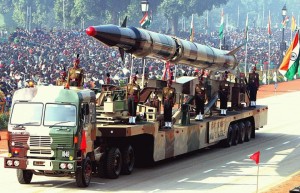
India shows off its missiles.
Roy reserves her harshest criticisms for Britain and America: “Meanwhile the International Coalition Against Terror makes war and preaches restraint. While India and Pakistan bay for each other’s blood the Coalition is quietly laying gas pipelines, selling us weapons and pushing through their business deals.” Roy goes on to expose the profiteering and neo-colonial mentality of the British, “busy arming both sides. Tony Blair’s “peace” mission … was actually a business trip to discuss a one billion pound deal … to sell Hawk fighter-bombers to India.” Roy concludes that one Hawk bomber could provide half a million Indians with clean drinking water for the rest of their lives.
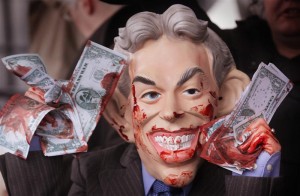
Tony Blair selling Hawks to India.
Had Roy merely condemned the religious fanaticism of the Indian and Pakistani states, Harris may well have represented her fairly, but she dares to criticise all sides, especially the more powerful states, which, for Harris, is a heresy that must be silenced.
THE “MORAL EQUIVALENCE” EQUATION
In The End of Faith, Harris quotes Roy (again from War Talk) on Noam Chomsky. Roy agrees with Chomsky’s position, that “the U.S. government refuses to judge itself by the same moral standards by which it judges others. … Its technique is to position itself as the well-intentioned giant whose good deeds are confounded in strange countries by their scheming natives, whose markets it’s trying to free, whose societies it’s trying to modernize, whose women it’s trying to liberate, whose souls it’s trying to save. . . . [T]he U.S. government has conferred upon itself the right and freedom to murder and exterminate people “for their own good.”” (Roy quoted in Harris. Harris’s ellipses.)

By 1998, the US had 180 spy satellites in orbit. Did they really not know that al-Shifa was a pharmaceutical plant?
Harris’s rendering makes it seem as if Roy condemns the US government for refusing to apply consistent moral standards in vacuo. Harris’s ellipses are interesting, because when we fill them in, we learn that Roy actually wrote that American politicians attempt to justify their actions by citing divine authority, which becomes an ethical smokescreen. If Harris were an honest critic of religion rather than a mere apologist for State-violence, he would have considered Roy’s and Chomsky’s analyses honestly. Instead, he worse than ignores them: he gives readers a false impression.
Here’s what Harris leaves out of the above quote. Roy (in War Talk) writes: “[US] Attorney General John Ashcroft has declared that U.S. freedoms are “not the grant of any government or document, but…our endowment from God”. [Roy’s ellipsis.] So, basically, we’re confronted with a country armed with a mandate from heaven. Perhaps this explains why the U.S. government refuses to judge itself by the same moral standards by which it judges others. (Any attempt to do this is shouted down as “moral equivalence.”)” Notice that Harris expunged the moral equivalence line.

The remains of al-Shifa after the bombing.
Roy continues: “Its technique is to position itself as the well-intentioned giant whose good deeds are confounded in strange countries by their scheming natives, whose markets it’s trying to free, whose societies it’s trying to modernize, whose women it’s trying to liberate, whose souls it’s trying to save. Perhaps this belief in its own divinity also explains why the U.S. government has conferred upon itself the right and freedom to murder and exterminate people “for their own good.””
Notice also how Harris expunges Roy’s line about America’s “own divinity.” Even more interesting is the fact that Harris does include the Ashcroft quote, but later in his The End of Faith book, and in the context of US domestic policy. His source is not Roy—even though he could have cited her book—but rather, Frank Rich (“Religion for Dummies,” New York Times, 23 April, 2002). In other words, mild critiques of US domestic policy and its being influenced by religion is okay, but detailed opposition to US foreign policy is verboten.

US cruise missiles blew up al-Shifa.
Harris paints US foreign policy as motivated by secular efforts to do good. Harris omits Roy’s statement about moral equivalence because that is the charge he levels against Chomsky.
THE CHOMSKY DEBATE
As noted at the start of this article, Harris approached Chomsky in early 2015 on a false premise, having already taken his book 9/11 out of context. In 9/11, writes Harris, “Chomsky urged us not to forget that “the U.S. itself is a leading terrorist state.” In support of this claim he catalogs a number of American misdeeds, including the sanctions that the United States [and Britain] imposed upon Iraq, which led to the death of “maybe half a million children.””
Notice that killing half a million children with sanctions is a “misdeed.” Notice also that it may not have happened: Harris quotes Chomsky as saying “maybe half a million.”

Medicine lost to al-Shifa.
Chomsky was actually quoting (in 9/11): “the statement of [US] Secretary of State Madeleine Albright over national TV when she was asked about the estimates of a half million deaths of Iraqi children as a result of the sanctions regime. She recognized that such consequences were a “hard choice” for her administration, but said “we think the price is worth it.”” Chomsky goes on to explain that the US applies a single-standard in world affairs: we do what we want (the mantra of the powerful).
Chomsky adds: “I mention this single example, easily multiplied, to illustrate the substantive meaning of the relaxation of constraints on state action. We may recall that violent and murderous states quite commonly justify their actions as “counter-terrorism””, including the Nazis. Chomsky continues: “I don’t know what name you give to the policies that are a leading factor in the death of maybe a million civilians in Iraq and maybe a half a million children, which is the price the Secretary of State says we’re willing to pay. Is there a name for that?”
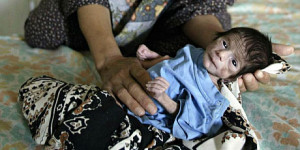
Anglo-American legacy in Iraq: mass child starvation.
As for the US being a leading terrorist State, Chomsky was quoting the opinion of the World Court. Notice that Harris omits the following from his rendering of Chomsky’s 9/11 book. Chomsky writes: “The horrifying atrocities of September 11 are something quite new in world affairs, not in the their scale and character, but in the target. For the United States, this is the first time since the War of 1812 that the national territory has been under attack, or even threatened.”
Chomsky continues: “The proper term” for Anglo-American aggression in Iraq, Kosovo, and elsewhere is not war, but ““crime”—perhaps “crime against humanity,” as Robert Fisk has stressed. But there are laws for punishing crimes … But that requires solid evidence, and it opens doors to dangerous questions: to mention only the most obvious one, who were the perpetrators of the crime of international terrorism condemned by the World Court 15 years ago?,” namely the US in a case brought against it by Nicaragua.
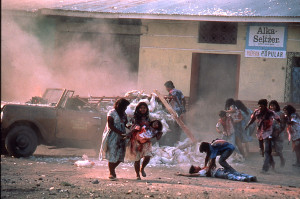
America’s illegal proxy war in Nicaragua.
Chomsky continues: “For such reasons, it is better to use a vague term, like “war.” To call it a “war against terrorism,” however, is simply more propaganda, unless the “war” really does target terrorism. But that is plainly not contemplated because Western powers could never abide by their own official definitions of the term, as in the U.S. Code or Army manuals. To do so would at once reveal that the U.S. is a leading terrorist state, as are its clients.”
DEBATING AL-SHIFA
Harris argues that because the Clinton administration didn’t mean to bomb a pharmaceutical plant in Sudan and indirectly kill tens of thousands of people, the same moral standard cannot be applied, compared to say “al-Qaeda”, which murders intentionally. Harris fails to point out that the bombing of Al-Shifa was a retaliation for the US Embassy bombings in Africa. That the retaliation was a violation of international law. That the plant was known worldwide as a pharmaceutical facility. And that Clinton offered no reparations, which one might expect from a benign, well-intentioned giant.
Harris describes Chomsky’s view of America as “a masterpiece of moral blindness.” Harris gives Al-Shifa as an example. “[L]et us now ask some very basic questions that Chomsky seems to have neglected to ask himself,” writes Harris: “What did the U.S. government think it was doing when it sent cruise missiles into Sudan? Destroying a chemical weapons site used by Al Qaeda. Did the Clinton administration intend to bring about the deaths of thousands of Sudanese children? No” (emphasis in original).

Malaria in Sudan today.
Recall that Harris wilfully omitted Roy’s statement about moral equivalence from The End of Faith. Harris writes: “If we are inclined to follow Chomsky down the path of moral equivalence and ignore the role of human intentions, we can forget about the bombing of the Al-Shifa plant, because many of the things we did not do in Sudan had even greater consequences,” such as sending aid to Sudan (emphasis in original).
Chomsky did in fact condemn the sanctions on Sudan, which contributed to the country’s misery, and even answered Harris’s charge of moral equivalence, which others had made against Chomsky long before Harris. Chomsky (again in 9/11) wrote: “When we estimate the human toll of a crime, we count not only those who were literally murdered on the spot but those who died as a result.” Chomsky points out that, “That is the course we adopt reflexively, and properly, when we consider the crimes of official enemies—Stalin, Hitler, and Mao, to mention the most extreme cases. Here, we do not consider the crime to be mitigated by the fact that it was not intended but was a reflection of institutional and ideological structures: the Chinese famine of 1958-1961, to take an extreme case, is not dismissed on grounds that it was a “mistake” and that Mao did not “intend” to kill tens of millions of people.”
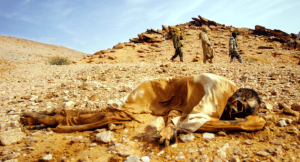
Sudan’s civil war. In the 1980s, the US trained Sudanese killer, John Garang.
Rather than tackling this, Harris ignores it and repeats the “we did not intend to kill innocent Sudanese” defence.
CONCLUSION
The above is just one of many instances where the New Atheists, not just Harris, have performed intellectual acrobatics, including bending over backwards, to shield the US, Britain, and Israel from criticism, and worse: to conceal State-crimes from the general public.
Hundreds of millions of people around the world believe fantastical things about “god” for all sorts of reasons: because they are told to, because it gives them comfort, because they are afraid to rebel, because they use religion as rebellion, etc., etc. The New Atheists haven’t moved beyond State-worship, and it is a truly lamentable reflection of contemporary intellectual culture that a large platform is given to such clowns.
T.J. Coles is director of the Plymouth Institute for Peace Research and co-writer and editor of Voices for Peace: Leading Scholars and Activists Examine America’s Modern Wars. His latest book is The New Atheism Hoax: How Harris, Hitchens, Dennett, and Dawkins Lie About Politics (www.pipr.co.uk/ebooks).
NOTES
[1] Sam Harris, “The limits of discourse,” SamHarris.org, 1 May, 2015, www.samharris.org/blog/item/the-limits-of-discourse and The Young Turks, “Sam Harris and Noam Chomsky exchange nasty emails until a winner emerges…”, YouTube, 14 May, 2015, https://www.youtube.com/watch?v=tkBRVRBhSso
[2] “Scoring the Noam Chomsky/Sam Harris Debate”, 8 May, 2015, https://www.alternet.org/news-amp-politics/scoring-noam-chomskysam-harris-debate-how-professor-knocked-out-atheist
